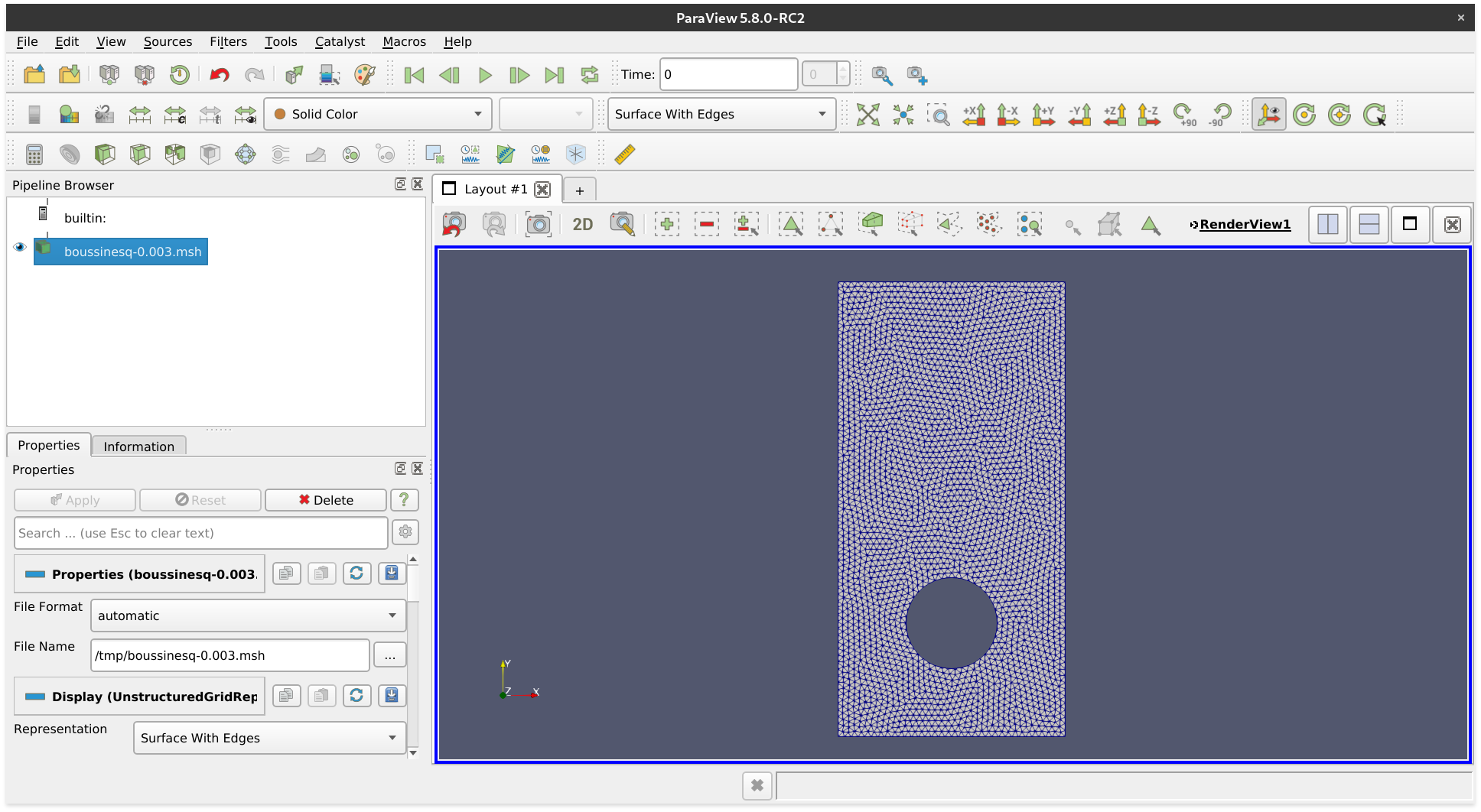
I/O for mesh files.












There are various mesh formats available for representing unstructured meshes.
meshio can read and write all of the following and smoothly converts between them:
Abaqus (.inp),
ANSYS msh (.msh),
AVS-UCD (.avs),
CGNS (.cgns),
DOLFIN XML (.xml),
Exodus (.e, .exo),
FLAC3D (.f3grid),
H5M (.h5m),
Kratos/MDPA (.mdpa),
Medit (.mesh, .meshb),
MED/Salome (.med),
Nastran (bulk data, .bdf, .fem, .nas),
Netgen (.vol, .vol.gz),
Neuroglancer precomputed format,
Gmsh (format versions 2.2, 4.0, and 4.1, .msh),
OBJ (.obj),
OFF (.off),
PERMAS (.post, .post.gz, .dato, .dato.gz),
PLY (.ply),
STL (.stl),
Tecplot .dat,
TetGen .node/.ele,
SVG (2D output only) (.svg),
SU2 (.su2),
UGRID (.ugrid),
VTK (.vtk),
VTU (.vtu),
WKT (TIN) (.wkt),
XDMF (.xdmf, .xmf).
(Here's a little survey on which formats are actually
used.)
Install with one of
pip install meshio[all]
conda install -c conda-forge meshio
([all] pulls in all optional dependencies. By default, meshio only uses numpy.)
You can then use the command-line tool
meshio convert input.msh output.vtk
meshio info input.xdmf
meshio compress input.vtu
meshio decompress input.vtu
meshio binary input.msh
meshio ascii input.msh
with any of the supported formats.
In Python, simply do
import meshio
mesh = meshio.read(
filename,
)
to read a mesh. To write, do
import meshio
points = [
[0.0, 0.0],
[1.0, 0.0],
[0.0, 1.0],
[1.0, 1.0],
[2.0, 0.0],
[2.0, 1.0],
]
cells = [
("triangle", [[0, 1, 2], [1, 3, 2]]),
("quad", [[1, 4, 5, 3]]),
]
mesh = meshio.Mesh(
points,
cells,
point_data={"T": [0.3, -1.2, 0.5, 0.7, 0.0, -3.0]},
cell_data={"a": [[0.1, 0.2], [0.4]]},
)
mesh.write(
"foo.vtk",
)
meshio.write_points_cells("foo.vtk", points, cells)
For both input and output, you can optionally specify the exact file_format
(in case you would like to enforce ASCII over binary VTK, for example).
Time series
The XDMF format supports
time series with a shared mesh. You can write times series data using meshio
with
with meshio.xdmf.TimeSeriesWriter(filename) as writer:
writer.write_points_cells(points, cells)
for t in [0.0, 0.1, 0.21]:
writer.write_data(t, point_data={"phi": data})
and read it with
with meshio.xdmf.TimeSeriesReader(filename) as reader:
points, cells = reader.read_points_cells()
for k in range(reader.num_steps):
t, point_data, cell_data = reader.read_data(k)
ParaView plugin

*A Gmsh file opened with ParaView.*
If you have downloaded a binary version of ParaView, you may proceed as follows.
- Install meshio for the Python major version that ParaView uses (check
pvpython --version) - Open ParaView
- Find the file
paraview-meshio-plugin.py of your meshio installation (on Linux:
~/.local/share/paraview-5.9/plugins/) and load it under Tools / Manage Plugins / Load New - Optional: Activate Auto Load
You can now open all meshio-supported files in ParaView.
Performance comparison
The comparisons here are for a triangular mesh with about 900k points and 1.8M
triangles. The red lines mark the size of the mesh in memory.
File sizes

I/O speed

Maximum memory usage

Installation
meshio is available from the Python Package Index,
so simply run
pip install meshio
to install.
Additional dependencies (netcdf4, h5py) are required for some of the output formats
and can be pulled in by
pip install meshio[all]
You can also install meshio from Anaconda:
conda install -c conda-forge meshio
Testing
To run the meshio unit tests, check out this repository and type
tox
License
meshio is published under the MIT license.









 *A Gmsh file opened with ParaView.*
*A Gmsh file opened with ParaView.*


